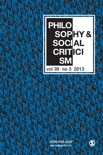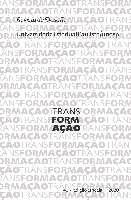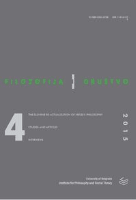
CRITIQUE
Scope & Guideline
Navigating the Intersection of History and Theory.
Introduction
Aims and Scopes
- Philosophical Inquiry:
The journal frequently publishes papers that delve into philosophical concepts, often engaging with historical figures such as Nietzsche, Proust, and contemporary thinkers. This reflects a commitment to understanding the evolution of philosophical thought and its relevance to modern discourse. - Cultural Criticism:
Many articles critique cultural artifacts, including literature, cinema, and art, thereby providing insightful analyses of societal values, ideologies, and power structures. This theme emphasizes the journal's role in fostering critical engagement with cultural products. - Social Theory and Political Analysis:
The journal explores themes of democracy, social justice, and political theory, particularly in relation to contemporary societal challenges. This focus underscores the importance of critical thought in addressing pressing social issues. - Historical Contextualization:
CRITIQUE often situates contemporary discussions within broader historical frameworks, allowing for a nuanced understanding of present issues through the lens of past events and ideologies. - Interdisciplinary Approaches:
The journal encourages interdisciplinary research, integrating perspectives from sociology, literature, philosophy, and the arts to create a more comprehensive understanding of complex issues.
Trending and Emerging
- Ecofeminism and Environmental Critique:
A significant increase in papers addressing ecofeminism and environmental issues showcases a growing concern for ecological crises and the intersection of gender and environmental justice. - Political and Social Activism:
Recent contributions emphasize themes of activism, social movements, and political critique, highlighting the journal's responsiveness to contemporary socio-political landscapes. - Interrogation of Modernity and Technology:
Emerging discussions on modernity, technology, and their implications for human experience reveal a critical engagement with the challenges posed by technological advancements. - Global and Transnational Perspectives:
There is a noticeable trend towards exploring global and transnational themes, reflecting a broader understanding of cultural exchanges and influences in a globalized world. - Queer Theory and Gender Studies:
An increasing number of publications focusing on queer theory and gender studies signal a commitment to exploring issues of identity, representation, and social justice within the journal's scholarly discourse.
Declining or Waning
- Traditional Literary Criticism:
There seems to be a reduction in papers focused solely on traditional literary criticism, as the journal increasingly shifts towards interdisciplinary approaches that incorporate social and political contexts. - Historical Literary Figures:
Papers centered exclusively on historical literary figures, while still present, are less frequent, indicating a possible waning interest in biographical studies in favor of broader thematic explorations. - Narrowly Defined Genres:
There is a noticeable decline in articles that strictly focus on specific literary genres or movements, suggesting a move towards more expansive and integrative discussions that transcend genre boundaries.
Similar Journals

Co-herencia
Enriching academic discourse with cutting-edge insights.Co-herencia, an esteemed academic journal published by UNIV EAFIT, is dedicated to advancing the fields of History, Literature and Literary Theory, Music, Philosophy, as well as the Visual Arts and Performing Arts. Since its launch as an Open Access journal in 2004, it has provided a platform for innovative research and interdisciplinary dialogue, facilitating the dissemination of knowledge from its base in Medellín, Colombia. With a commendable range of Scopus rankings, including a Q2 category in Literature and Literary Theory and Visual Arts and Performing Arts, Co-herencia is recognized as a vital resource for scholars aiming to explore cultural narratives and theoretical frameworks. It not only enriches academic discourse but also serves as a significant conduit for emerging ideas that connect art, culture, and social consciousness. Researchers, professionals, and students alike will find Co-herencia a necessary addition to their scholarly pursuits, emphasizing its critical role in the evolving landscape of the arts and humanities.

Cultura-Rivista di Filosofia Letteratura Storia
Illuminating the Tapestry of Philosophy, Literature, and HistoryCultura-Rivista di Filosofia Letteratura Storia, published by SOC ED IL MULINO, is an esteemed Italian journal dedicated to the exploration of intersectional themes in philosophy, literature, and history. With its ISSN 0393-1560 and E-ISSN 2612-2391, this journal has carved a niche in the academic landscape, particularly focusing on critical and interdisciplinary approaches that bridge these fields. Despite its Q4 category rankings in 2023 across various categories including Arts and Humanities (miscellaneous), History, Literature and Literary Theory, and Philosophy, the journal seeks to illuminate underrepresented theoretical perspectives and expansive scholarly discourse. As it converges into its operational years from 2019 to 2024, Cultura aims to invigorate the academic dialogue in its disciplines, providing a platform for both emerging and established researchers. With the lack of Open Access options, readers are encouraged to engage with the rich compendium of articles available, poised to enhance their understanding and appreciation of the intricacies within these interrelated domains.

PHILOSOPHY & SOCIAL CRITICISM
Challenging Norms, Inspiring Thought.PHILOSOPHY & SOCIAL CRITICISM, published by SAGE Publications Inc, stands as a pivotal platform for high-quality scholarly discourse, bridging the realms of philosophy and social theory. Since its inception in 1973, this esteemed journal has evolved to encompass provocative analyses and critical examinations of social issues, thereby playing an influential role in shaping contemporary philosophical thought. With an impressive Q1 ranking in the field of philosophy and a Q2 ranking in sociology and political science for 2023, it attracts contributions from leading academics and thought leaders. The journal, which spans topics of significance from the philosophies of ethics to the socio-political landscapes of modernity, provides crucial insights that inform both research and practical applications. Although currently not an open access journal, it offers robust access options through institutional subscriptions, ensuring its wide availability within the academic community. By engaging with the interdisciplinary dialogue fostered in its pages, researchers, professionals, and students alike can benefit from the rich academic exchange that PHILOSOPHY & SOCIAL CRITICISM facilitates, solidifying its importance in the scholarly landscape.

Trans-Form-Acao
Connecting Ideas, Inspiring MindsTrans-Form-Acao is a prominent Open Access journal published by UNESP-MARILIA, dedicated to the field of Philosophy. Since its inception in 1974, the journal has fostered a vibrant academic discourse within the humanities, encouraging scholars to share innovative ideas and critical analyses. With an ISSN of 0101-3173 and an E-ISSN of 1980-539X, it has gained significant recognition in Scopus, ranking #285 out of 806 in the Arts and Humanities category, placing it in the 64th percentile for philosophy journals (2023). The journal's commitment to accessibility and rigorous scholarship has positioned it within the Q3 quartile, reflecting its growing influence and esteem in philosophical studies. Scholarly contributions are welcome across a range of philosophical topics, making it an essential resource for researchers, professionals, and students alike who seek to engage with contemporary philosophical thought. For further details, please refer to their address at AV HYGINO MUZZI FILHO, 737, MARILIA, SP 17525-900, BRAZIL.

NEW GERMAN CRITIQUE
Engaging Scholars in the Dynamics of Modern German ThoughtNEW GERMAN CRITIQUE is a prominent academic journal published by Duke University Press, focusing on the dynamic intersections of German studies, cultural theory, and social thought. With its ISSN 0094-033X and E-ISSN 1558-1462, this journal facilitates a critical dialogue within the Arts and Humanities and Cultural Studies fields. As a Q3-ranked journal in both categories as of 2023, it represents a significant platform for scholars exploring contemporary issues through a German lens, addressing themes of identity, memory, and cultural politics. Although NEW GERMAN CRITIQUE is not an open-access journal, it remains a crucial resource for researchers, professionals, and students interested in the evolving landscape of cultural studies, inviting contributions that foster innovative perspectives and facilitate intellectual exchange. Founded in 1988 and continuing its vital discourse into 2024, the journal is headquartered in Durham, North Carolina, and serves as a touchstone for those engaged in the complexities of modern German culture and its global implications.

SOCIETY
Bridging Theory and Practice in Political ScienceSOCIETY is a distinguished academic journal published by SPRINGER, dedicated to advancing the understanding of critical issues in sociology and political science. With its ISSN 0147-2011 and E-ISSN 1936-4725, the journal has been a key resource since its inception in 1968, maintaining a consistent commitment to quality scholarship through its convergence over the decades. In the 2023 Scopus rankings, it holds an impressive Q3 designation in the categories of Social Sciences (Miscellaneous) and Sociology and Political Science, reflecting its solid reputation within the academic community. The impact factor of the journal underscores its relevance, making it a vital platform for researchers, professionals, and students aiming to contribute to and engage with contemporary social discourse. Although not an open-access journal, it offers a wealth of peer-reviewed articles that explore multifaceted dimensions of society, shedding light on societal trends, policies, and challenges that shape our world today. Located at One New York Plaza, Suite 4600, New York, NY, SOCIETY invites you to join its community of scholars driving innovative research and thought-provoking discussion.

Pensamiento al Margen
Navigating contemporary challenges through academic insight.Pensamiento al Margen, a vibrant academic journal based in Murcia, Spain, has been a significant contributor to the field of social sciences and cultural studies since its inception. With an ISSN of 2386-6098 and operating as an Open Access platform since 2014, it ensures that academic discourse is accessible to a broader audience, facilitating the free exchange of ideas among researchers, professionals, and students. Published by PENSAMIENTO AL MARGEN, this journal aims to foster interdisciplinary dialogue while addressing contemporary issues and challenges in society. Through its commitment to quality and innovation in research, Pensamiento al Margen stands out as a preferred venue for scholars looking to disseminate impactful findings and engage with pressing themes in the academic landscape. Join the community of thought leaders by contributing or accessing this essential resource in scholarly communication.

Cartaphilus
Bridging Ideas, Cultivating KnowledgeCartaphilus is a distinguished academic journal published by UNIV MURCIA, focusing on a multidisciplinary approach to the humanities and social sciences. Based in Spain, the journal aims to foster dialogue and collaboration among researchers, practitioners, and students in these fields. Although specific metrics like the impact factor and H-index are currently not available, Cartaphilus strives to be a vital resource for original research, innovative ideas, and critical discourse, contributing to the advancement of knowledge in the humanities. The journal is particularly valuable for scholars seeking an open platform for their work, as it emphasizes accessibility and inclusivity in scholarly communication. By bridging various disciplines and perspectives, Cartaphilus plays a crucial role in the academic landscape, encouraging new insights and enriching the scholarly community.

Philosophy and Society-Filozofija i Drustvo
Cultivating Multidisciplinary Perspectives on Contemporary IssuesPhilosophy and Society-Filozofija i Drustvo is an esteemed, peer-reviewed journal published by the UNIV BELGRADE, INST PHILOSOPHY & SOCIAL THEORY, with ISSN 0353-5738 and E-ISSN 2334-8577. Established as an Open Access platform since 2002, the journal provides a vital avenue for scholars to disseminate their research in the fields of philosophy, sociology, and political science. Based in Belgrade, Serbia, it has become increasingly influential, reflected in its Scopus rankings—#413 in Arts and Humanities (Philosophy) and #1185 in Social Sciences (Sociology and Political Science). The journal aims to foster critical discourse and multidisciplinary dialogue, serving both seasoned researchers and emerging scholars alike. As it continues its journey in the converged years from 2018 to 2024, Philosophy and Society remains committed to exploring philosophical inquiries within contemporary societal contexts, addressing pressing issues and questions that shape our world.

INQUIRY-AN INTERDISCIPLINARY JOURNAL OF PHILOSOPHY
Empowering Scholars Through Open Access Philosophical InquiryINQUIRY - AN INTERDISCIPLINARY JOURNAL OF PHILOSOPHY, published by Routledge Journals, Taylor & Francis Ltd, stands as a pivotal platform for the exploration of philosophical discourse, particularly at the intersection of philosophy and health policy. With its ISSN 0020-174X and E-ISSN 1502-3923, this journal has been committed to open access since 2014, thereby fostering an inclusive environment for both dissemination and engagement in critical philosophical inquiry. Spanning its rich history from 1958 to 2024, INQUIRY is consistently recognized for its significant contributions, boasting a 2023 ranking of Q1 in Philosophy and Q2 in Health Policy, indicative of its scholarly impact and prestige. Currently, it ranks #69/806 in Arts and Humanities for Philosophy and #170/310 in Medicine for Health Policy, solidifying its role as a vital resource for researchers, professionals, and students committed to advancing knowledge across disciplines. The journal's address in Milton Park, Abingdon, UK, further embeds it within a robust academic community that champions interdisciplinary collaboration and innovation.